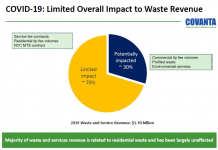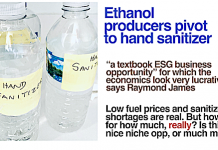by Debra Fiakas CFA
Recently, in compiling our lists of remarkable small-cap stock trades, I was surprised to find the shares of Ceres, Inc. (CERE: Nasdaq) among stocks setting new 52-week lows. Ceres has only been trading since its initial public offering in February 2012, when the company sold 5.0 million shares at $13.00 per share. After a brief trade higher in the early spring, Ceres shares have been steadily losing ground, finally setting an all-time low of $6.02 last week.
 Named after the Greek Goddess of Agriculture, Ceres is a self-styled energy crop producer. Ceres has developed proprietary seeds for sweet sorghum and switchgrass to be used as feedstock for ethanol production. Ceres seeds are genetically modified to produce crops that require less water and fertilizer and are tolerant of higher salt levels in soil. Higher yields and consistent availability lead to improved economics for large-scale ethanol production.
Named after the Greek Goddess of Agriculture, Ceres is a self-styled energy crop producer. Ceres has developed proprietary seeds for sweet sorghum and switchgrass to be used as feedstock for ethanol production. Ceres seeds are genetically modified to produce crops that require less water and fertilizer and are tolerant of higher salt levels in soil. Higher yields and consistent availability lead to improved economics for large-scale ethanol production.
A big part of Cere’s IPO pitch was the market opportunity in Brazil where ethanol production is highly dependent upon seasonal production of sugarcane. Sweet sorghum is compatible with existing equipment and helps fill in the gap between sugarcane crops. Ceres worked with a joint venture led by Petrobras in a commercial planting of sorghum that for all practical purposes was successful.
The Greek Goddess has other reasons to smile on Ceres. Amyris (AMRS: Nasdaq) used Cere’s sorghum syrup in its proprietary yeast fermentation system to produce Amyris’ farnesene, an oil used in producing diesel. Amyris had been widely reported as exiting biofuels to concentrate chemical know-how in the cosmetics sector. However, in July 2012, Amyris announced a revision of its collaboration with Total, Gas and Power, SA (TOT: NYSE) to carry the renewable farnesene torch forward. Total agreed to give Amyris $30 million this year to continue a research and development program. The verdict is still out on whether the developments at Amyris will make a difference for Ceres.
With the U.S. corn crop severely reduced by drought this year, ethanol producers may look at sorghum with greater interest. Sorghum fields are still in relatively good condition this year, demonstrating the plant’s hardiness. The problem is that farmers do not find sorghum an attractive crop. Unlike corn, which has many uses, there are few buyers for sorghum. Thus promoting sorghum in the U.S. probably means a collaboration like that in Brazil with a crop sponsored by an ethanol producer.
Even if investors have lost confidence in Ceres to make sorghum a favored ethanol feedstock, the Company has plenty of capital to keep trying. At the end of May 2012, Ceres had $67.7 million in cash on its balance sheet, just a bit more than the $65.2 million it raised in its 2012 IPO. In the last twelve months Ceres used $25 million of its cash to support operations and continued development work on new seeds. Even if the company makes no attempt to curtail spending, I estimate Ceres has a big enough nest egg to keep trying to another two years.
Debra Fiakas is the Managing Director of Crystal Equity Research, an alternative research resource on small capitalization companies in selected industries.
Neither the author of the Small Cap Strategist web log, Crystal Equity Research nor its affiliates have a beneficial interest in the companies mentioned herein. CERE is included in the Cellulosic Ethanol group of Crystal Equity Research’s Beach Boys Index.








